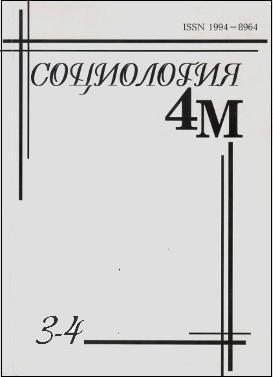Индикаторы развития как инструмент социального программирования: зарубежный опыт
Для цитирования
Жукова Н.В. Индикаторы развития как инструмент социального программирования: зарубежный опыт // Социология: методология, методы, математическое моделирование (Социология:4М). 2016. № 3-4. С. 110-153.
Аннотация
Прослеживается эволюция подходов к определению целей и измерению уровня развития социальной сферы в контексте формирования государственных социальных программ. Подробно описываются и анализируются наиболее известные агрегатные характеристики, а также системы показателей благосостояния (качества жизни) населения. Помимо объективных, отражающих объективные условия существования человека, достаточное внимание уделяется субъективным индикаторам, учитывающим мнения и суждения людей относительно этих условий, их удовлетворенность жизнью. Отдельный раздел посвящен современным источникам социальной информации за рубежом.
Ключевые слова:
социальные индикаторы, социальное программирование, качество жизни, базовые потребности, объективные индикаторы, субъективные индикаторы, системы социальных индикаторов
Литература
The OECD List of Social Indicators. Paris, 1982.
Целесообразность дополнения национальных счетов балансов показателями благосостояния. Нью-Йорк: ООН, 1977.
Зайцев В. К. Система национальных счетов и государственное программирование в Японии. М.: Наука, 1984.
Miles I. Social Indicators for Human Development. L., 1985.
Towards a system of Social and Demographic Statistics. NY: UN, 1975.
Brodsky D. A., Rodric D. Indicators of Development and Data Availability. The case of the PQLI // World Development. 1981. V. 9. N 7.
De Neufville J. I. Social Indicators of Basic Needs: Quantitative Data for Human Policy // Social Indicators Research. 1982.V. 11.N4.
WilliamsonJ. B. Social Security and the Physical Quality of Life in Developing Nations: a Cross-national Analysis //Social Indicators Research. 1987.V. 19.N2.
MoumT. The Role of Values and Life Goals in Quality of Life // Quality of Life: Problems of Accessment and Measurement. Paris: UNESCO, 1981.
CampbellA., etal. The Quality of American Life: Perceptions, Evaluations and Satisfactions. NY: 1976.
Land K. C. Social Indicators Models: Review // Social Indicators Models. NY, 1975.
Dobrianov V. Social Indicators and Social Management // Social Indicators Research. 1984. V. 14. N 3.
Mills C. A. On Social Indicators and Development. Geneva, 1980.
HowtoMeasureWell-being: OECD's Program to Develop on Set of Social Indicators //The OECDObserver. 1973.N64.
GlatzerW., etal. Objective Life Conditions and Subjective Well-being // Social Indicators Research. 1987.V. 19. N1.
JohnstonD. F. Basic Disaggregations of Main Social Indicators. P.: OECD, 1987.
AndorkaR. Social Indicators System for CMEA-country and Hangary // Social Indicators Research. 1984.V. 14.N3.
JapaneseWorking Life Profile (Statistical Aspect). Tokyo, 1987.
HakimC. Secondary Analysis in Social Research. A Guide to Data Sources and Methods with Examples. L., 1982.
Целесообразность дополнения национальных счетов балансов показателями благосостояния. Нью-Йорк: ООН, 1977.
Зайцев В. К. Система национальных счетов и государственное программирование в Японии. М.: Наука, 1984.
Miles I. Social Indicators for Human Development. L., 1985.
Towards a system of Social and Demographic Statistics. NY: UN, 1975.
Brodsky D. A., Rodric D. Indicators of Development and Data Availability. The case of the PQLI // World Development. 1981. V. 9. N 7.
De Neufville J. I. Social Indicators of Basic Needs: Quantitative Data for Human Policy // Social Indicators Research. 1982.V. 11.N4.
WilliamsonJ. B. Social Security and the Physical Quality of Life in Developing Nations: a Cross-national Analysis //Social Indicators Research. 1987.V. 19.N2.
MoumT. The Role of Values and Life Goals in Quality of Life // Quality of Life: Problems of Accessment and Measurement. Paris: UNESCO, 1981.
CampbellA., etal. The Quality of American Life: Perceptions, Evaluations and Satisfactions. NY: 1976.
Land K. C. Social Indicators Models: Review // Social Indicators Models. NY, 1975.
Dobrianov V. Social Indicators and Social Management // Social Indicators Research. 1984. V. 14. N 3.
Mills C. A. On Social Indicators and Development. Geneva, 1980.
HowtoMeasureWell-being: OECD's Program to Develop on Set of Social Indicators //The OECDObserver. 1973.N64.
GlatzerW., etal. Objective Life Conditions and Subjective Well-being // Social Indicators Research. 1987.V. 19. N1.
JohnstonD. F. Basic Disaggregations of Main Social Indicators. P.: OECD, 1987.
AndorkaR. Social Indicators System for CMEA-country and Hangary // Social Indicators Research. 1984.V. 14.N3.
JapaneseWorking Life Profile (Statistical Aspect). Tokyo, 1987.
HakimC. Secondary Analysis in Social Research. A Guide to Data Sources and Methods with Examples. L., 1982.
Форматы цитирования
Другие форматы цитирования:
APA
Жукова, Н. В. (2016). Индикаторы развития как инструмент социального программирования: зарубежный опыт. Социология: методология, методы, математическое моделирование (Социология:4М), (3-4), 110-153. извлечено от https://www.soc4m.ru/index.php/soc4m/article/view/3857
Выпуск
Раздел
СОЦИОЛОГИЯ И СМЕЖНЫЕ ДИСЦИПЛИНЫ





